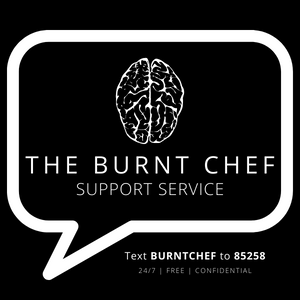Blog: stress and hospitality
By Kris Hall, Founder of The Burnt Chef Project
Health and wellbeing can be influenced by work, both positively (spice of life) and negatively (burnout). Work can provide a goal and meaning in life. It can give structure and content to our day, our week, our year and our life. It can offer us identity, self-respect, social support and material rewards. This is more likely to happen when work demands are optimal and not maximal, when workers are allowed to exercise a reasonable degree of autonomy, and when the ‘climate’ of the work organisation is both friendly and supportive.
Does this sound like something that features in your organisation? If this is so, work can be one of the most important health-promoting factors in life. If, however, work conditions are characterised by the opposite attributes, they are, at least in the long run, likely to cause ill-health, accelerate its course or trigger its symptoms.
Some of these symptoms, like anger, irritability, or restlessness, feeling unmotivated or unfocussed or likely to make poor decisions may seem familiar, and I’ve heard previously used to define the term ‘chef’, but perhaps these are less related to personality types and more as a result of the environmental conditions?
Internal Controls
Actions to reduce work-related stress that could harm staff and impact their wellbeing and business efficiency need not be complicated, time consuming or expensive and may yield amazing results. One of these down-to-earth approaches is called internal controls or, more specifically, HSE Working Minds.
Breaking down the mitigation of workplace stress into a step-by-step process need not be stressful or even complicated. Empower your teams, the very people who experience the stress you’re trying to tackle, to pro-actively aid you in creating a healthier workplace.
There are many things that you can look to consider including:
- Work schedules
Designing work rotas to avoid conflict with demands and responsibilities outside of work. These shift patterns should be stable and predictable.
- Participation/control
Do your workers feel like they are in control of their role and can make decisions that make a meaningful action to affect their job?
- Workload
How many times in a row are your staff doing a busy Saturday night service then up early the next day for a busy lunch service? Is there adequate recovery time from the role? Especially as it’s full of both demanding physical and mental tasks.
- Social Environment
Now the hospitality trade has this in bundles, right? A few social drinks after work that lead to a night out? Or maybe the environment has a strong hierarchy system (which features pretty commonly in kitchen environments) which may be breeding fear and discontent?
Providing opportunities for healthy social interaction away from drugs or alcohol which promotes emotional or social support and help between workers instils a stronger sense of belonging.
- Future
Avoiding ambiguity in matters of job security and career development is a must. Promoting life-long learning is proven to captivate staff and lead to a fulfilled sense of purpose. Building this relationship with your staff allows you to focus on longer term retention and a happier workforce.
Final Thought
Perhaps the role of a GM, Head Chef, Head Bar person or any head of department isn’t just to ensure staff are working at the correct times, meeting financial targets and performing appropriately but to encourage and grow the individual on a personal level through 1:1 training and coaching that supersedes the skill sets required for the role in question.
Consider that it may not always be the role that has caused the initial issue of poor mental health or stress but may be adding to the duration and severity of it. Maybe your experience with financial matters, conflict resolution or perhaps your own mental health journey is a better fit for an individual who may be showing signs of long-term stress?
If you’d like to talk to anyone about your mental health or would like to signpost people in your team to a confidential, free service simply text BURNTCHEF to 85258 anytime 24/7 and you’ll be connected to a trained volunteer.
More about the Burnt Chef Project
The Burnt Chef Project is a non-profit social enterprise fully committed to making the hospitality profession healthier and more sustainable. They provide free training and resources to the hospitality community to aid better mental health and wellbeing. They sell merchandise and additional training courses to raise funds to provide this free support to the hospitality industry. They also build the capability of owners, line managers and employees through training to enhance the awareness of mental health and open conversations. https://www.theburntchefproject.com/











